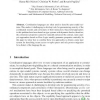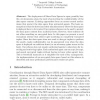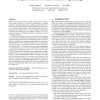129
Voted
EUROPAR
2007
Springer
15 years 4 months ago
2007
Springer
Utility computing is a service provisioning model which will provide adaptive, flexible and simple access to computing resources, enabling a pay-per-use model for computing simila...
132
Voted
ESCIENCE
2007
IEEE
15 years 4 months ago
2007
IEEE
— The environmental science and engineering communities are actively engaged in planning and developing the next generation of large-scale sensor-based observing systems. These s...
102
Voted
ESCIENCE
2007
IEEE
15 years 4 months ago
2007
IEEE
141
click to vote
COORDINATION
2008
Springer
15 years 4 months ago
2008
Springer
Abstract. We propose and formalize HomeBPEL, a higher-order WSBPEL-like business process execution language where processes are firstclass values that can be stored in variables, p...
126
click to vote
COORDINATION
2008
Springer
15 years 4 months ago
2008
Springer
Abstract. Coordination languages are often used to describe open ended systems. This makes it challenging to develop tools for guaranteeing security of the coordinated systems and ...
148
Voted
COORDINATION
2008
Springer
15 years 4 months ago
2008
Springer
Most mature workflow management systems (WfMSs) available today execute workflows via orchestration of an available set of services, a process in which a central coordinating enti...
150
Voted
COORDINATION
2008
Springer
15 years 4 months ago
2008
Springer
Abstract. The deployment of Share Data Spaces in open, possibly hostile, environments arises the need of protecting the confidentiality of the data space content. Existing approach...
103
click to vote
PPOPP
2010
ACM
15 years 4 months ago
2010
ACM
Helper locks allow programs with large parallel critical sections, called parallel regions, to execute more efficiently by enlisting processors that might otherwise be waiting on ...
116
Voted
COORDINATION
2008
Springer
15 years 4 months ago
2008
Springer
Abstract. The actor model provides high-level concurrency abstractions to coordinate simultaneous computations by message passing. Languages implementing the actor model such as Er...
117
click to vote
COORDINATION
2008
Springer
15 years 4 months ago
2008
Springer
Recently, specific attention has been devoted to the development of service oriented process calculi. Besides the foundational aspects, it is also interesting to have prototype imp...






